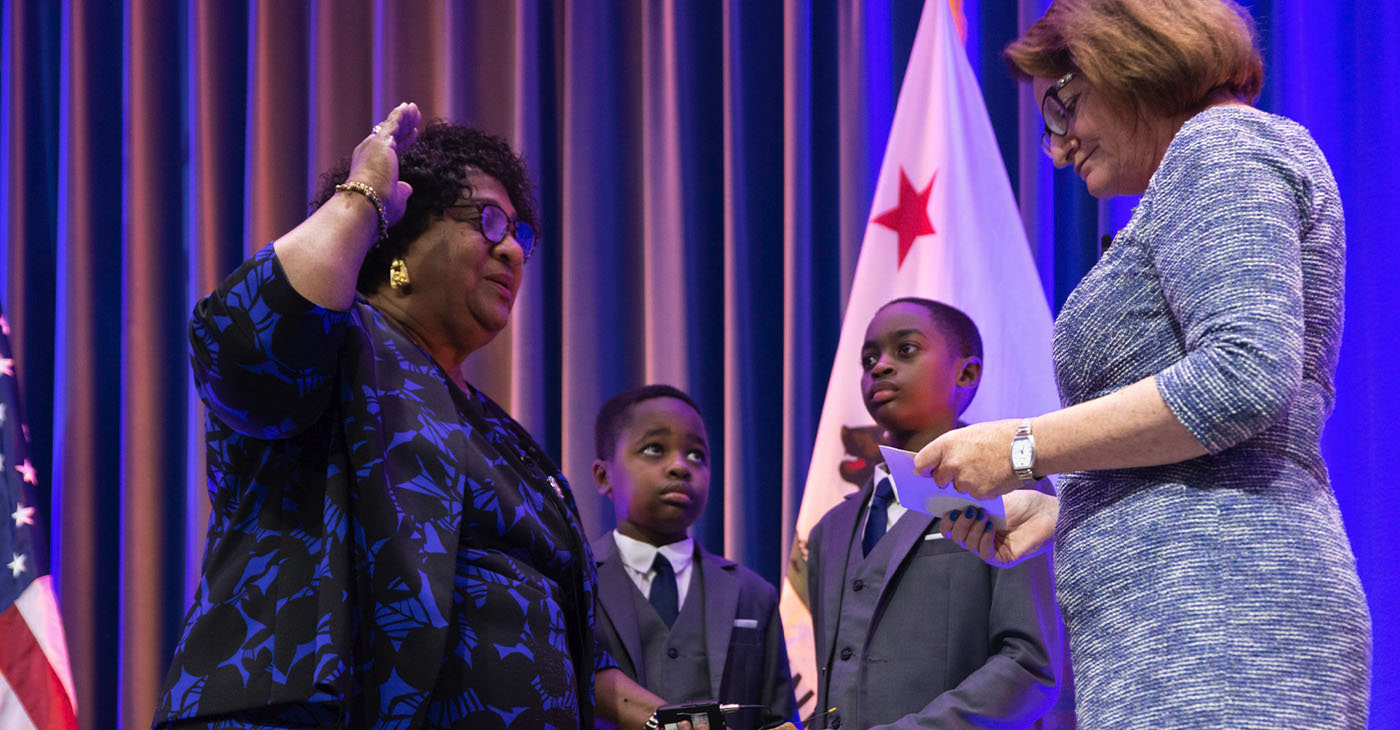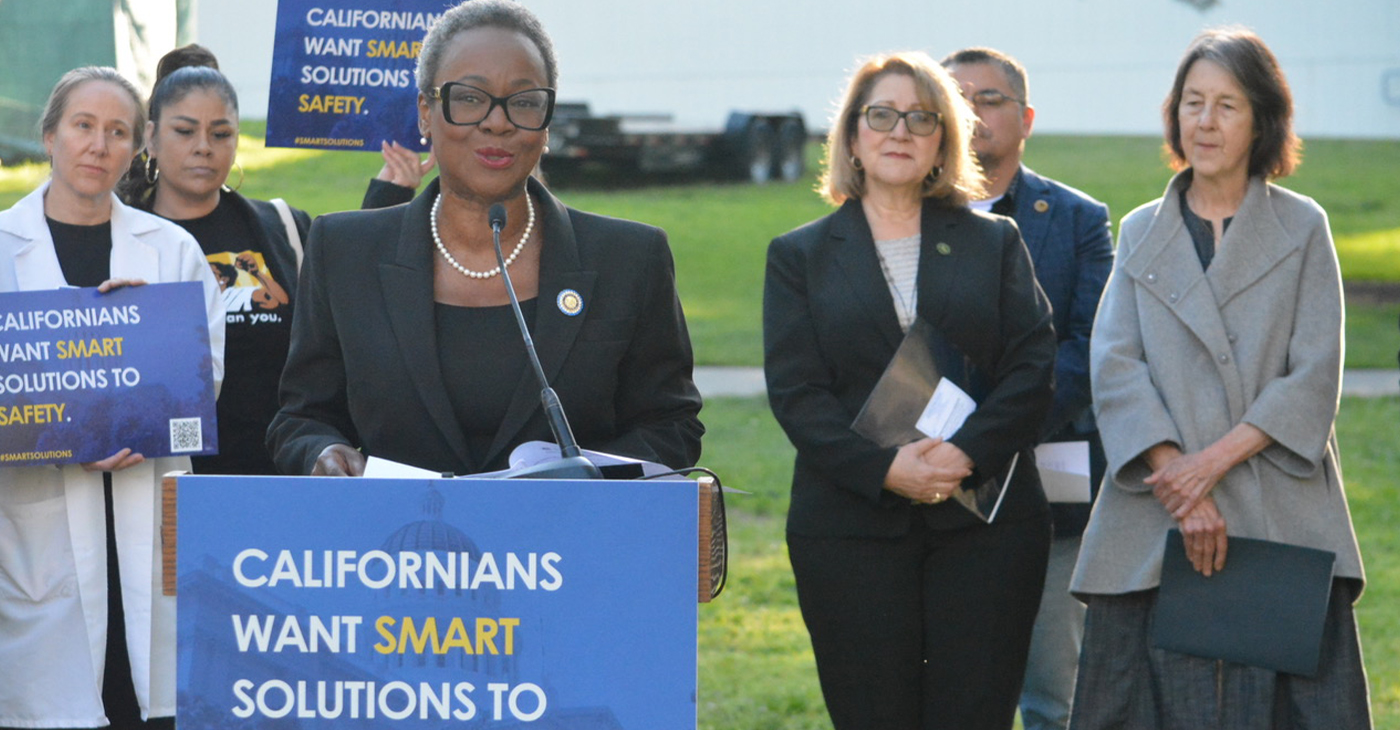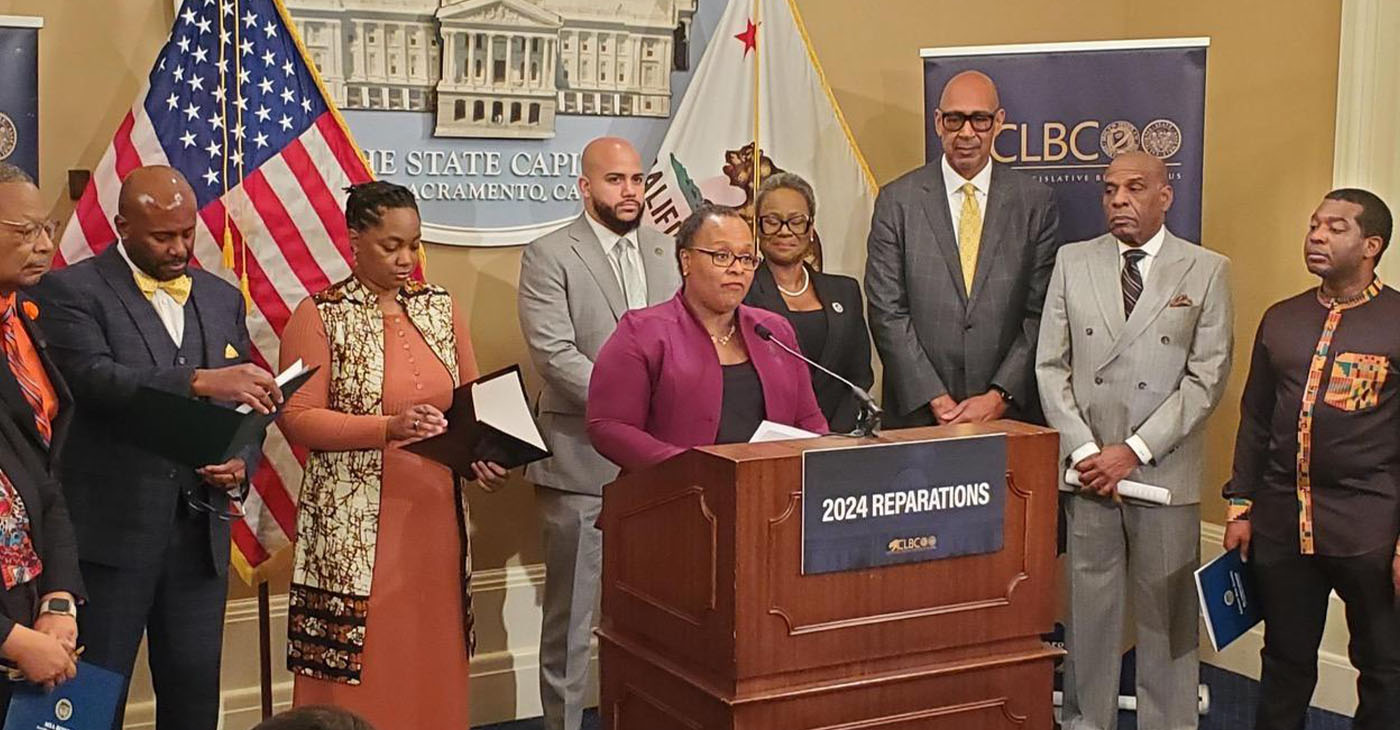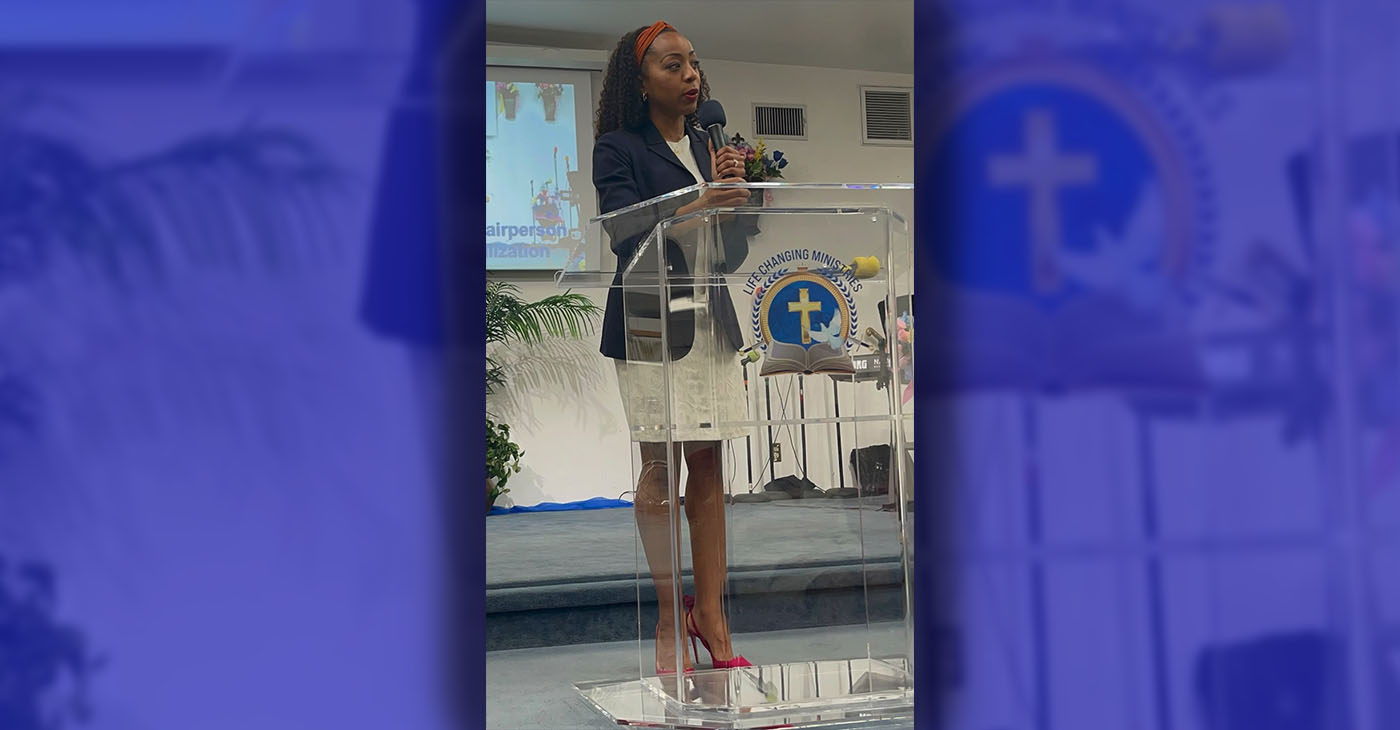Antonio Ray Harvey
Shirley Weber Sworn in as California’s First Elected Black Secretary of State
The Secretary of State is the chief elections officer of the state, responsible for overseeing and certifying elections, as well as testing and certifying voting equipment for use in California. Weber’s duties also include overseeing the state’s archives division and registry of businesses.

By Antonio Ray Harvey, California Black Media
On Jan. 9, with the sound of African drumming in the background, Shirley Weber was sworn in as the first elected Black Secretary of State (SOS) of California and the 32nd person to hold the position.
The ceremony was conducted at the SOS’ auditorium in downtown Sacramento, one block south of the State Capitol.
Senate President pro Tempore Toni G. Atkins (D-San Diego) administered the oath of office in front of Weber’s grandsons Kadir and Jalil Gakunga.
“I want to thank all of those who work so hard to make this position, the Secretary of State — and all of those wonderful things that come with it — possible, and for being in my life,” Weber said. “I have been blessed beyond imagination with all of the good things California has to give.”
The daughter of a sharecropper from Hope, Arkansas, Weber said she is “not supposed to be here” as the state’s chief clerk, overseeing a department of 500-plus employees.
Weber grew up in a two-room, “clapboard house” in Arkansas with her parents and five other siblings before the family relocated to Los Angeles where they lived in Pueblo Del Rio, a housing project known as the “pueblos.”
Weber said the “data” projected that she would not have a bright future. Still, she went on to graduate from UCLA with a PhD, serve on the San Diego Board of Education, teach African American studies at San Diego State University, and successfully run for California State Assembly in November 2012.
“My father came from Hope, Arkansas, because there was no hope in Hope,” Weber said. “He came to California because he wanted his children to have a better chance and a better life.”
When Gov. Gavin Newsom appointed Alex Padilla the state’s junior U.S. Senator in January 2021, he nominated Weber as SOS. Padilla filled in for Sen. Kamala Harris, who had been elected U.S Vice President. Weber was officially installed as SOS in April 2021.
Weber’s plan after serving in the Legislature was to move to Ghana, Africa, and “build a house up in the hills.” But that all changed when Newsom called.
“It was hard for me to think about becoming Secretary of State because I was so content in the Assembly,” Weber said. “When I was asked to be Secretary of State, I thought hard and long about it. I realized that everything about the Secretary of State was central to my life. I thought to myself that I am always the one taking the hard challenges. I said who better than a kid of sharecropper, who never had a chance to vote, who could fight for the rights of voters.”
The Secretary of State is the chief elections officer of the state, responsible for overseeing and certifying elections, as well as testing and certifying voting equipment for use in California. Weber’s duties also include overseeing the state’s archives division and registry of businesses.
In her remarks, Atkins praised Weber’s “leadership” and “morality” and called her “a tireless champion of democracy,” adding that those characteristics are integral to performing the duties of Secretary of State.
Atkins told guests that she first met Weber when she was 24 years old and that Weber helped her run for state Assembly.
For the first time in its history, California has three Black constitutional officers. The others are Controller Malia M. Cohen and Superintendent of Public Instruction Tony Thurmond.
“You know, our constitutional officers are unique, and I give credit to our Governor (Gavin Newsom) and the people of California.”
“There is no other list of constitutional officers like this? Where do you have a list of constitutional officers where it only has one white male in it? That is unheard of. The diversity (and) the fact that women are constitutional officers in California is historic.”
Weber’s daughter, Assemblymember Akilah Weber (D-San Diego) was the ceremony’s emcee while Assemblymember Chris Holden (D-Pasadena) provided the invocation. David Bauman’s African drumming and musical selections by Dr. Tecoy Porter, pastor of Genesis Church Sacramento and president of the National Action Network Sacramento Chapter and his Genesis Church choir provided the entertainment. Weber’s son Akil Weber provided the closing statements.
“Words cannot express how truly proud I am of what my mother has done, what she will continue to do, the door she has opened, the legacy she is creating,” Assemblymember Akilah Weber said of her mother.
Antonio Ray Harvey
Sacramento Lawmakers Step Up Push for “Smart Solutions” on Crime, Public Safety
Assemblymember Tina McKinnor (D-Inglewood) and Sen. Lola Smallwood-Cuevas (D-Ladera Heights), both members of the California Legislative Black Caucus (CLBC), have joined other lawmakers and criminal justice reform advocates to address public safety in the state. On April 2, CLBC members gathered outside the State Capitol for the unveiling of the #SmartSolutions Public Safety Policy Platform, a package of 30 bills that addresses the top concerns of retailers, retail workers, the fentanyl crisis, and support for victims and survivors of crime.

By Antonio Ray Harvey, California Black Media
Assemblymember Tina McKinnor (D-Inglewood) and Sen. Lola Smallwood-Cuevas (D-Ladera Heights), both members of the California Legislative Black Caucus (CLBC), have joined other lawmakers and criminal justice reform advocates to address public safety in the state.
On April 2, CLBC members gathered outside the State Capitol for the unveiling of the #SmartSolutions Public Safety Policy Platform, a package of 30 bills that addresses the top concerns of retailers, retail workers, the fentanyl crisis, and support for victims and survivors of crime.
“Instead of being tough on crime, we need to be smart on crime,” Smallwood said at the press briefing. “I am not saying that we’re not going to be holding folks accountable for the actions that they take. But we will not rely on incarceration as a solution.”
McKinnor, Smallwood-Cuevas, a coalition of advocates, addiction treatment experts, and Yurok Tribal leaders joined Sen. Nancy Skinner (D-Berkeley), and Assemblymember Eloise Gómez Reyes (D-Colton) at the press conference organized to promote legislative solutions that ensure safety and justice.
Organizers say #SmartSolutions is an intersectional campaign that combats criminalization and mass incarceration by pushing for the redirection of state resources to fund housing, health care, schools, services for victims, and programs that reduce recidivism and promote accountability, beyond incarceration.
Opponents of the bills proposed in the #SmartSolutions campaign say their colleagues who support reform-focused strategies are looking the other way on crime and encouraging lawlessness.
For example, Assemblymembers Wendy Carillo (D-Boyle Heights), Carlos Villapudua (D-Stockton) and Mike Gipson (D-Carson) are supporting Assembly Bill (AB) 1990, legislation that would allow a peace officer to arrest shoplifters without a warrant or without witnessing the theft.
Assemblymember James Ramos (D-Highland) authored AB 1772 and introduced it in January. The legislation proposes sterner penalties for retail theft, particularly for repeat offenders.
The #SmartSolutions campaign is co-sponsored by Ella Baker Center for Human Rights, Smart Justice California, American Civil Liberties Union (ACLU) California Action, Californians for Safety and Justice, and Californians United for a Responsible Budget (CURB).
Smallwood recently introduced two bills she hopes will provide solutions to the escalating retail theft problem in the state. Senate Bill (SB) 1446 addresses theft, technology and job security in retail establishments and aims to minimize workplace violence, according to supporters. SB 1282 requires counties to expand the use of a diversion program for theft cases.
“Restorative Justice is the essential pillar of making our criminal justice system more fair, just, and equitable,” McKinnor said. “Restorative justice recognizes the trauma of victims and preparatory of crimes and provides a constructive space for victims to find healing.”
Dr. Amiee Moulin, founder of the California Bridge program and chief of the Division of Addiction Medicine at the University of California (UC) Medical Center, said drug “addiction and overdose” are taking a toll on patients, families and the community.
“I believe that California’s proposed legislation focused on expanding access to treatment is a crucial step towards saving lives,” Moulin said. “By removing barriers to care and embracing evidenced-based strategies we can provide patients the support they need to heal and recover.”
Antonio Ray Harvey
Advocates Weigh in on Calif. Black Caucus Reparations Package
On Feb. 21, the California Legislative Black Caucus (CLBC) held a press conference at the state Capitol to introduce a package of reparations legislation the lawmakers call “a starting point” to atone for the state’s legacy of discrimination. All 12 members of the CLBC were present to explain their efforts to rectify the damages caused by systemic discrimination against Black Californians detailed in the 1,100-page report by the first-in-the-nation California reparations task force.

By Antonio Ray Harvey
California Black Media
On Feb. 21, the California Legislative Black Caucus (CLBC) held a press conference at the state Capitol to introduce a package of reparations legislation the lawmakers call “a starting point” to atone for the state’s legacy of discrimination.
All 12 members of the CLBC were present to explain their efforts to rectify the damages caused by systemic discrimination against Black Californians detailed in the 1,100-page report by the first-in-the-nation California reparations task force.
The nine-member panel submitted the recommendations on June 28, 2023.
CLBC chairperson Lori Wilson (D-Suisun City) said it may take three to seven years to pass legislation aimed at implementing the task force’s recommendations.
The package the CLBC members presented consists of 14 legislative proposals, each designed to address different aspects of systemic racism and inequality.
One proposal, Senate Bill (SB) 490, put forth by CLBC Vice Chair Sen. Steven Bradford (D-Inglewood), calls for the establishment of the California American Freedmen Affairs Agency (CAFAA).
This agency would administer reparations programs and aid Black families researching their family lineage. The cost of implementing such an agency has not yet been estimated, but reparations advocates say its creation signifies a step toward acknowledging and rectifying past injustices.
Another proposal by Assemblymember Cory Jackson (D-Riverside), ACA 7, seeks to amend Prop 209, the initiative passed by voters in 1996 that prohibits considering race, color, sex, or nationality in public employment, education, and contracting decisions.
This amendment would allow the governor to approve exceptions to the law in order to address poverty and improve educational outcomes for African Americans and other marginalized groups.
Bradford also discussed proposal legislation aimed at compensating families whose properties were seized through eminent domain as a result of racism and discrimination.
The package of bills includes a measure proposed by Assemblymember Reggie Jones Sawyer (D-Los Angeles), Assembly Bill (AB) 3089 to formally acknowledge California’s history of slavery and discrimination, requiring lawmakers to issue a formal apology.
Additionally, a proposed constitutional amendment, ACA 8, sponsored by Wilson aims to ban involuntary servitude, particularly within the state’s prison system.
Reparations advocates and social justice groups from statewide organizations shared their support and criticism of the 14-bill reparations package with California Black Media (CBM).
A Coalition for a Just and Equitable California (CJEC) stated that the CLBC’s package does not address direct-cash payment, which, for that group’s leadership, is a non-negotiable component of any proposed compensation package.
“Our coalition’s unwavering commitment has been to pursue lineage-based reparations, encompassing direct monetary payments/compensation, state recognition of descendants as a protected class, and the establishment of the California American Freedman Affairs Agency through Senate Bill (SB) 490,” CJEC member Chris Lodgson outlined in a statement.
Lodgson continued, “We believe these vital components are imperative and a necessary first step toward true reparations. As we’ve communicated to elected officials directly for some time, we believe any reparations package must be targeted explicitly and exclusively to California’s 2 million Black American descendants of persons enslaved in the U.S. (American Freedmen).”
Media present at the news briefing persistently questioned Wilson and other CLBC members about direct payments.
Wilson mentioned that the budget deficit California is currently facing is being considered in discussions about compensation. A Legislative Analyst’s Office report released Feb. 20, estimates that the state’s budget shortfall could expand to $73 billion by May.
“In regard to direct-cash payments to individuals, we will continue to have that discussion as we navigate the next few years,” Wilson said. “As noted, we’re halfway through a legislative session. We have about three months of the legislative process in each house (Senate and Assembly) to work through these existing bills.
“In the next session, we have two years, and during that two-year session, we will consider including additional payments whether they are direct-cash payments or direct payments to communities,” Wilson said.
The Alliance for Reparations, Reconciliation, and Truth (ARRT), a collaboration of California’s leading Black power-building and justice groups, supports seven of CLBC’s 14 reparations bills with proposals that include the restoration of property, establishing the property tax assistance for Descendants of Enslaved Persons program, a formal apology for human rights violations and crimes against humanity, amending the California Constitution to prohibit involuntary servitude for incarcerated persons, and prohibiting discrimination based on natural and protective hairstyles.
“The California Legislative Black Caucus reparations package marks a historic and meaningful moment in time. ARRT encourages lawmakers to pursue an even more expansive and definitive action to fulfill the reparations principles as recognized by the United Nations,” stated James Woodson, AART co-founder and executive director of the California Black Power Network. “Reparative justice must be impactful, transformative, and enduring, thus paving the way toward atoning for the wrongdoings deeply imprinted in the state’s history and healing this democracy.”
ARRT is a collaboration between the Black Equity Collective, the California Black Power Network, Catalyst California, Equal Justice Society, and Live Free USA, Live Free California.
Former members of the California reparations task force have partnered with AART: Loyola-Marymount clinical psychologist professor Dr. Cheryl Grills; Oakland-based civil rights attorney Lisa Holder; Dr. Jovan Scott Lewis, chair of the Department of Geography at the University of California Berkeley and Oakland-based attorney Donald Tamaki.
“We absolutely are (in support of direct-cash payments),” Woodson told California Black Media. “I think we got to have it all. There were multiple harms that were caused and one of them was financial and that needs to be compensated for with cash payments. And there are also systemic harms that were created. We need to change laws. We need to change how rules work because a lot of it flows out of anti-Black racism. We have to have everything because if you leave anything out it’s not for reparations.”
CBM also learned that there will be a series of listening sessions with the CLBC to help educate Californians about the reparation bills and the workings of the legislative process.
The members of the CLBC are Assemblymember Lori D. Wilson (D-Suisun City); Sen. Steven Bradford (D-Inglewood); Assemblymember Akilah Weber (D-La Mesa); Assemblymember Isaac Bryan (D-Los Angeles); Assemblymember Mia Bonta (D-Alameda); Assemblymember Chris Holden (D-Pasadena); Assemblymember Mike Gipson (D-Carson); Assemblymember Corey Jackson (D-Riverside); Assemblymember Reggie Jones-Sawyer (D- Los Angeles); Assemblymember Tina McKinnor (D-Inglewood); and Sen. Lola Smallwood-Cuevas (D-Los Angeles).
Antonio Ray Harvey
Controller Malia Cohen: Despite $68 Billion Deficit, California Has Enough Cash to Pay Bills
Over the next few months, Californians will spend time processing the details of Governor Gavin Newsom’s 2024-2025 spending plan, which he is expected to present to the Legislature on Jan. 10 in Sacramento. However, reports of the state’s whopping $68 billion budget deficit — as projected by the nonpartisan Legislative Analyst’s Office (LAO) — have foreshadowed the Governor’s announcement with uncertainty.

Antonio Ray Harvey
California Black Media
Over the next few months, Californians will spend time processing the details of Governor Gavin Newsom’s 2024-2025 spending plan, which he is expected to present to the Legislature on Jan. 10 in Sacramento. However, reports of the state’s whopping $68 billion budget deficit — as projected by the nonpartisan Legislative Analyst’s Office (LAO) — have foreshadowed the Governor’s announcement with uncertainty.
Despite anticipation of deep budget cuts, State Controller Malia M. Cohen has expressed confidence that California’s fiscal cash flow is in the position to withstand any financial challenges caused by forecasted economic downturn.
“Despite reports from various sources indicating a budgetary deficit of approximately $68 billion, the state’s cash position remains strong, and, absent any unforeseen circumstances, the state has sufficient cash to pay its bills and meet its financial obligations through the end of the fiscal year,” Cohen said in a Dec. 19, 2023, letter.
Cohen is responsible for accountability and disbursement of the state’s financial resources. She has independent auditing authority over government agencies that spend state funds.
According to the LAO, the budget shortfall increased by $53 billion when compared to the projections used in the development of the current year budget – up from $15 billion when the 2023–24 Budget was signed in June. The LAO faced challenges in providing budget estimates due the IRS delaying tax filings until Nov. 16, 2023.
Regarding personal income, sales and property tax revenues, the state’s primary revenues, California entered an economic downturn in 2022 that is affecting the budget.
On Dec. 15, Senate Minority Leader Brian W. Jones (R-San Diego) and Senate Budget Vice Chair Roger Niello (R-Fair Oaks) wrote a letter to Gov. Newsom, urging him to “act early” to address the state’s worsening fiscal condition.
“This budget deficit will impact every California resident and doesn’t matter whether you’re a Republican or Democrat,” Jones stated. “That’s why we must roll up our sleeves and work together to bring spending in line with revenues.”
Cohen has been monitoring the state’s financial reports and clarified California is protected by its “rainy day reserves.”
“The state currently has more than $91.4 billion in available borrowable resources, due in large part to the Governor’s and Legislature’s foresight in building prudent rainy-day reserves in the Budget Stabilization Account,” Cohen stated.
The budget negotiations will involve new leaders of the legislature — Assembly Speaker Robert Rivas (D-Salinas) and incoming Senate President Pro tempore Mike McGuire (D-Santa Rosa).
Rivas added California Legislative Black Caucus members Assemblymember Dr. Akilah Weber (D-La Mesa and Assemblymember Corey Jackson (D-Moreno Valley) to the Assembly’s budget leadership team in December. Weber will lead Subcommittee 1 on Health while Jackson will guide Subcommittee 2 on Human Services.
“While legislators will have difficult choices to make in the new year, I am confident they will be deliberate in addressing the budget challenges before them, and I urge them to protect, to the extent possible, the health and social service programs designed to benefit those who are displaced, without shelter, or otherwise economically disadvantaged,” Cohen stated.
-

 Activism4 weeks ago
Activism4 weeks agoOakland Post: Week of March 27 – April 2, 2024
-

 #NNPA BlackPress4 weeks ago
#NNPA BlackPress4 weeks agoBeloved Actor and Activist Louis Cameron Gossett Jr. Dies at 87
-

 Community1 week ago
Community1 week agoFinancial Assistance Bill for Descendants of Enslaved Persons to Help Them Purchase, Own, or Maintain a Home
-

 Activism3 weeks ago
Activism3 weeks agoOakland Post: Week of April 3 – 6, 2024
-

 Business1 week ago
Business1 week agoV.P. Kamala Harris: Americans With Criminal Records Will Soon Be Eligible for SBA Loans
-

 Activism2 weeks ago
Activism2 weeks agoOakland Post: Week of April 10 – 16, 2024
-

 Community1 week ago
Community1 week agoAG Bonta Says Oakland School Leaders Should Comply with State Laws to Avoid ‘Disparate Harm’ When Closing or Merging Schools
-

 Community6 days ago
Community6 days agoOakland WNBA Player to be Inducted Into Hall of Fame






















































